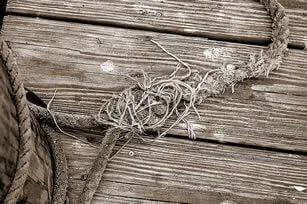A profitable return for little effort.
Money for old rope
What's the meaning of the phrase 'Money for old rope'?
What's the origin of the phrase 'Money for old rope'?
Any online search for the expression ‘money for old rope’ will bring up many pages which state authoritatively that it originated in reference to the payment for old, frayed ropes which were subsequently used to fill cracks between planks on ships. These usually date the practice to ‘the days of sail…‘, which is one of those phrases that set etymologists’ noses twitching (the other being ‘I was told that…’).
Is that story true? Well, no, I’m afraid not (and it’s a pity that the rope in question can’t talk as it might express that better as “I’m a frayed knot”). The politest response would be that this story is folk-etymology, a.k.a. nonsense stories, made up to fool the gullible – see a few more made-up stories here.
What’s at work with the ‘money for old rope’ story is the old friend (enemy?) of etymology – plausibility. Gaps between planks on ships were indeed filled with a material called caulk, which was made largely from hemp soaked in tar. The ropes on sailing ships were made from hemp and old ropes (and new ones too) were used to caulk planking. Given the method and the fact that the phrase exists in the language, many have put two and two together… and made five.
What’s lacking is anything that actually supports the link between the caulking of sailing ships and the phrase. The killer blow is really that the phrase wasn’t known in English until the 1930s – well after the heyday of sailing ships, in the British author James Curtis’s novel Gilt Kid, 1936:
He would spin her a fanny about the marriage laws, tie the poor kid up. It ought to be money for old rope.
Given that Curtis used the slang expression without any explanation of it, it’s probable that he expected his readers to be familiar with it and that it may well have been in wide circulation in England in 1936. It can’t date from much earlier than that though as it appears nowhere else in print.
The copious archives of The Old Bailey proceedings have numerous mentions of ‘old rope’ throughout the 18th and 19th centuries, but nowhere is there any mention of ‘money for old rope’.
The definitive dictionary of sailors’ language dating from the aforementioned ‘days of sail’ – The Sailor’s Word-Book: an alphabetical digest of nautical terms, by the admirable Admiral William Henry Smyth, has no mention of the phrase.
‘Money for old rope’ is most likely to have originated in a similar manner to ‘money for jam’. This was a British Army expression from around WWI. The reference is to the ubiquity of jam in the soldiers’ diet and that it had little value. ‘Old rope’ had the same status. ‘Money for old rope’ just means ‘easy money’ – the nautical origin is, sad to say as it would have made a nice addition to my list of nautical phrases, bogus.
The history of “Money for old rope” in printed materials
Trend of money for old rope in printed material over time
Browse more Phrases
About the Author

Phrases & Meanings
A-Z
A B C D E F G H I J K L M N O P Q R S T UV W XYZ
Categories
American Animals Australian Bible Body Colour Conflict Death Devil Dogs Emotions Euphemism Family Fashion Food French Horses ‘Jack’ Luck Money Military Music Names Nature Nautical Numbers Politics Religion Shakespeare Stupidity Entertainment Weather Women Work
How did we do?
Have you spotted something that needs updated on this page? We review all feedback we receive to ensure that we provide the most accurate and up to date information on phrases.
